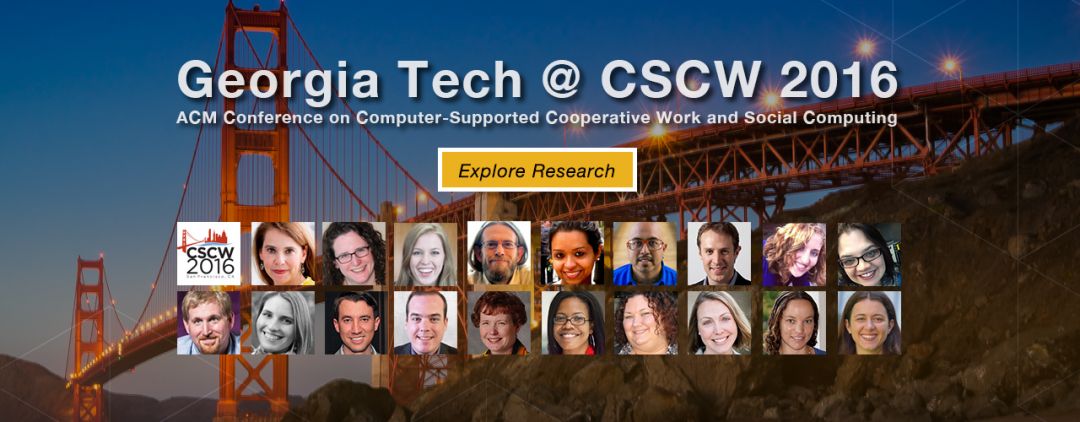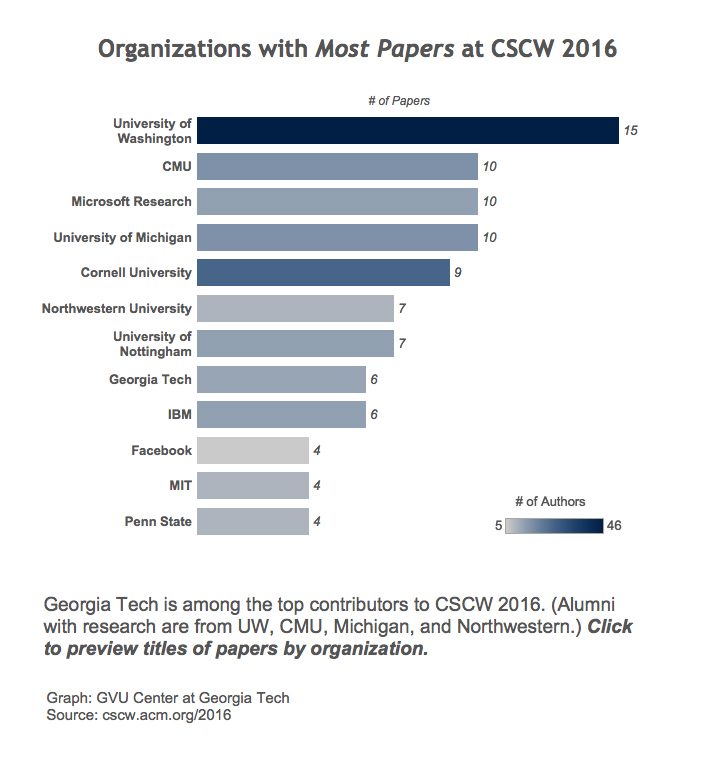Georgia Tech Research Delves into How Online Interactions Shape Social Behavior, Perceptions of Accessibility, and Digital Content Creation
Georgia Tech @ CSCW 2016
Georgia Tech is a top contributor of research at the ACM 2016 Conference on Computer-Supported Cooperative Work and Social Computing (CSCW 2016), which takes place Feb. 27-March 2 in San Francisco. The accepted work includes 11 Georgia Tech researchers who co-authored six papers and makes up 4 percent of the main program at CSCW 2016. Including alumni research, the contributions climb to 13 percent of papers. CSCW's top author with four accepted papers is Sarita Schoenebeck, PhD HCC 12, an alumna who was advised by Professor of Interactive Computing Amy Bruckman.
CSCW 2016 Top Honors
Among the top 15 percent of research papers at CSCW 2016 are two honorable mentions from Georgia Tech – both in the Food and Health category – that examine the darker side of social media and efforts to mitigate negative online interactions.
 "#thyghgapp: Instagram Content Moderation and Lexical Variation in Pro-Eating Disorder Communities" is a study into social media content on Instagram that reveals methods used by groups that encourage harmful “self-injury” that is either physical or emotional. The study of more than 2.5 million posts from 100,000 users looked at content from pro-eating disorder communities after Instagram started moderating the communities (i.e. banning search of certain tags) and how the groups subvert the attempts at moderation. The paper is co-authored by Stevie Chancellor, Jessica Pater, Trustin Clear, Eric Gilbert and Munmun De Choudhury.
"#thyghgapp: Instagram Content Moderation and Lexical Variation in Pro-Eating Disorder Communities" is a study into social media content on Instagram that reveals methods used by groups that encourage harmful “self-injury” that is either physical or emotional. The study of more than 2.5 million posts from 100,000 users looked at content from pro-eating disorder communities after Instagram started moderating the communities (i.e. banning search of certain tags) and how the groups subvert the attempts at moderation. The paper is co-authored by Stevie Chancellor, Jessica Pater, Trustin Clear, Eric Gilbert and Munmun De Choudhury.
"Online communities have long been studied for their enabling role in improving health and well-being,” says Munmun De Choudhury, assistant professor of Interactive Computing and co-author on the paper. “Through our research, we seek to understand how these communities may be leveraged to extend timely, tailored help and social-emotional support to individuals vulnerable to mental health challenges."
"Quantifying and Predicting Mental Illness Severity in Online Pro-Eating Disorder Communities" examines the same Instagram data and looks for the presence of mental illness severity (MIS) in users posting pro-eating disorder content. The researchers found that an alarming proportion of users whose content expresses high MIS is on the rise, approximately a 13 percent increase per year since 2012. Their method can also predict future risk of MIS with around 81 percent accuracy. The paper is co-authored by Stevie Chancellor, Zhiyuan (Jerry) Lin, Erica L. Goodman, Stephanie Zerwas and Munmun De Choudhury.
Internet Accessibility in Less Affluent Countries
Less than half the world's population has access to the Internet. Amy Bruckman, Interactive Computing, has developed a networked solution for Cubans (who are part of the have-nots) to get information via their national email system. A Facebook group acts as a repository for requests from Cubans and anyone can send back an answer via email. It's a decidedly low-tech solution that helps level the playing field for access in the information age. The paper is co-authored by Michaelanne Dye, Annie Anton and Amy Bruckman.
New Scientist highlights the Georgia Tech work, named Cuba Intercambio (or Exchange), in a piece that looks at how big tech companies are delivering online access to countries where it is limited and how the free and open Internet might take shape differently in these less affluent parts of the world.
Who Owns Your Facebook, YouTube and Pinterest Posts?
From amateur creativity to social media status updates, nearly every Internet user is also a content creator, but who owns that content isn't always clear. On popular web platforms where people can post and share instantly, agreeing to the Terms of Service is often a painless tradeoff for access to potentially big audiences. Amy Bruckman and alumna Casey Fielser, PhD HCC 15, found that content creators often don't understand the copyright licenses included in Terms of Service agreements or what they are granting the Facebooks and YouTubes of the world by agreeing to them. Users also have expectations of how their content is treated based on websites' community norms, which may differ from actual terms of service.
“Users care about how their content can be used, yet lack critical information,” writes lead author Casey Fiesler. “Site designers should take user needs and community norms into account in creating and explaining copyright policies.”
The paper is co-authored by Casey Fiesler, Cliff Lampe, and Amy Bruckman.
Read the Georgia Tech research papers linked in this data interactive and explore the diversity and contributions the work is making to shape how people use computing technology to support everyday activities.

Georgia Tech students, faculty and alumni at CSCW 2016 in San Francisco, Calif.
Standing (l to r): Keith Edwards, Kurt Luther, Amy Voida, James Eagan, Saeideh Bakhshi, Amy Bruckman, Andrew Miller, Beth Mynatt, Jessica Pater, Andrea Forte, Parisa Khanipour Roshan, Lana Yarosh, Andrea Grimes Parker, Sarita Schoenebeck, James Clawson and Casey Fiesler. Sitting (l to r): Eshwar Chandrasekharan, Stevie Chancellor, Nassim JafariNaimi, Michaelanne Dye, Neha Kumar, Julia Deeb and Shagun Jhaver. (Photo courtesy of alumna Casey Fiesler)
Writer/Data Interactives: Joshua Preston (jpreston@cc.gatech.edu)




